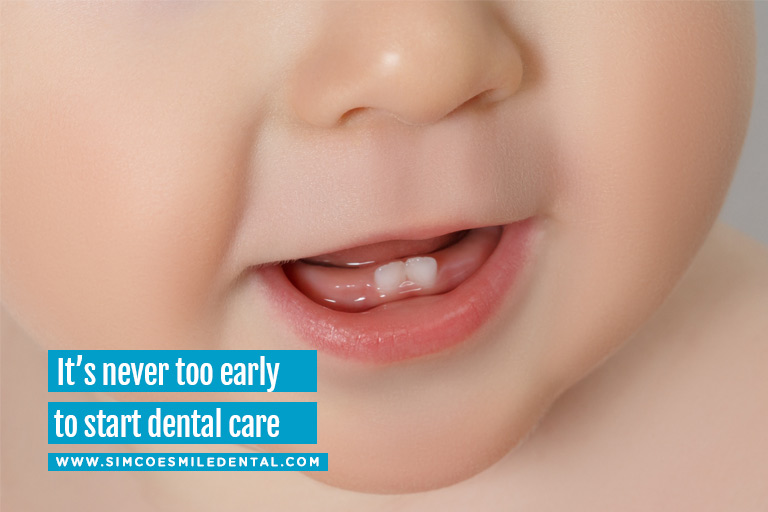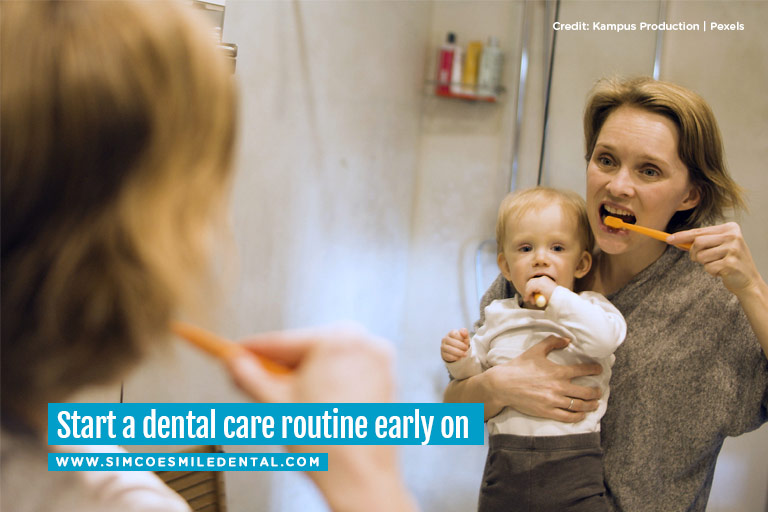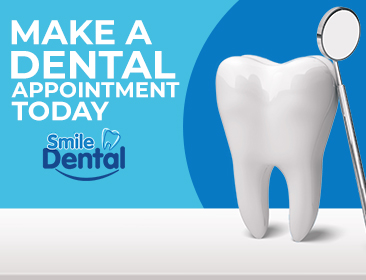Tooth decay affects about 60 to 90% of toddlers around the world. In Canada alone, 1 in 3 surgeries performed on children aged 1 to 5 is caused by tooth decay.
The health of your kids’ teeth is vital to their general well-being. Poor dental hygiene can increase your child’s risk for cavities, gum disease, and other dental health problems. It is your duty as a parent to promote good oral hygiene and assist your child in developing healthy dental habits as they grow.
We understand that many struggle to determine the dental care their children need. You may be asking, “How can I help my toddler with their oral health?” To answer your question, here are a few important tips to set you and your kids on the correct path to healthy teeth.
Why Healthy Teeth Is Important for Kids
Starting good habits early will not only help your children develop their teeth properly, but it will also help them become strong, healthy, and self-assured adults. Dentists advise that oral hygiene for babies and toddlers should start even before the first infant tooth emerges.
Here’s why:
- Prevent Disease
When it comes to both adult and children’s dental care, the goal is to prevent oral health problems from occurring in the first place. Taking appropriate care of your child’s developing teeth helps lessen plaque build-up, fend off gum disease and tooth decay, and enhance their general well-being. - Support Healthy Teeth Development
The needs of children’s teeth are substantially different from those of adults.
The teeth, gums, and jaw of your child are still developing and changing every day. A healthy baby tooth helps preserve the gaps intended for the permanent teeth to grow. - Teach Responsibility
Regular tooth brushing and flossing have purposes other than just achieving a healthy smile. It develops a child’s daily habits, which are crucial for their growth. They find comfort in routine and the knowledge that you’ll be there every day to help them. Additionally, routines teach your children the value of responsibility and time management.
When to Start Oral Care for Your Baby?
Despite not being visible, your baby’s teeth are already formed (and stored) inside their jaws at birth. It is important to check up on your child’s teeth development and perform the necessary care.
Here’s how to clean baby teeth naturally for each stage of growth:
- 0 to 6 Months
After feeding, be sure to carefully massage their gum tissues using your index finger wrapped in a soft, clean washcloth.
Teething often begins between 4 and 6 months. However, it’s also normal to find some baby teeth coming in early. When this happens, your infant’s gums may seem red and swollen, and you may notice an increase in salivation. Don’t be alarmed. You may ease the discomfort by giving your infant a cool, damp towel or a clean teething ring. The teething rings can also be chilled since the cold soothes inflamed gums.
- 6 to 12 Months
Keep washing and massaging your baby’s gums after feedings, even if the first tooth has already come in. They should brush their teeth with a soft-bristled toothbrush and no toothpaste.
Begin weaning your infant off the bottle, then gradually introduce solid meals and transition them to drinking from a cup.
Always inspect your child’s teeth and gums. Keep an eye out for any little white or brown patches on their teeth, since these might be the first indications of dental decay.
Schedule your child’s first dental appointment. Infants should get a dental examination before their first birthday or within 6 months of the eruption of their first tooth.
- 12 to 18 Months
Clean your child’s teeth using only plain water at least twice a day. Keep looking for indications of dental decay on their teeth. To keep your child’s teeth and gums healthy, keep practicing proper oral hygiene.
- 18 Months to 5 Years Old
Teach your child how to clean their teeth when they begin to develop their fine motor skills. Start brushing your toddler’s teeth with a pea-sized fluoride toothpaste. Make sure to gently teach them the right brushing methods and assist when your toddler struggles brushing teeth.
Keep checking them for any signs of tooth decay even if they are already capable of brushing their own teeth.
Visit the dentist for a routine check-up more frequently or every 6 months.
Dental Care Tips
Here are some more dental care tips to teach your child and prevent toddler teeth decay:
- Make oral care a part of a daily routine
As soon as possible, establish a regular oral hygiene routine for your kid. This will improve the chances that both you and your child will continue this healthy routine once their teeth start to grow. - Breastfeeding is best for babies
Milk, whether breast milk or infant formula, is the only food your baby needs for the first 6 months of their life. Breast milk, however, has elements that guard against tooth decay and is rich in proteins that preserve your baby’s tooth enamel and help with tooth growth. - Don’t put your baby to sleep with a bottle
Some of the milk from the bottle stays in the mouth and on the teeth of newborns who sleep with it. It is advised that they not take the bottle to bed since it can result in tooth decay and raise the risk of choking and ear infections. Remember to take your baby from the breast or bottle after feeding. - Water is the best drink for your toddler
Your child should favour drinking water, so make sure they do so frequently throughout the day. Water from the tap should be boiled and chilled before consuming for infants less than 12 months. - Use the correct toothbrush
Use a toothbrush made particularly for babies after the first teeth appear.
These brushes contain extremely soft bristles and smaller heads to prevent hurting delicate gums. Until your child can effectively clean their own teeth, you should brush theirs. Additionally, you should be very careful about the toothpaste brand you select. Keep the quantity of toothpaste to a minimum and think about using fluoride-free toothpaste until your child has learned not to swallow while they brush.
- Make an appointment for your child’s dental health examination on or before age 2
Regular check-ups that start as early as age 2 allow for the early detection and treatment of any dental issues. Early on in your child’s development, choose a dental office you can trust, so the dentist can identify any possible issues before they grow into more serious ones.
Make sure your kids grow with healthy teeth by starting a strong dental routine early on. For a kids’ dentist in Oshawa, you can trust, visit Simcoe Smile Dental. Call us at (289) 312-1482 to book your appointment.




